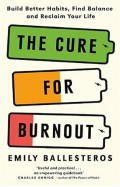- Home
- Books
- Categories
- Fiction
- Historical Fiction
- Burnout - The Emotional Experience of Political Defeat
Burnout - The Emotional Experience of Political Defeat
By: Hannah Proctor
-
Rs 3,916.00
- Rs 4,895.00
- 20%
You save Rs 979.00.
Due to constant currency fluctuation, prices are subject to change with or without notice.
–Hannah Zeavin, Founding Editor, Parapraxis
–Hannah Zeavin, Founding Editor, Parapraxis
How to maintain hope in the face of despair
In the struggle for a better world, setbacks are inevitable. Defeat can feel overwhelming at times, but it has to be endured. How then do the people on the front line keep going? To answer that question and to help readers roll with the punches, Hannah Proctor draws on historical resources to find out how revolutionaries and activists of the past kept a grip on hope.
Burnout considers former Communards exiled to a penal colony in the South Pacific; a young Bolshevik fleeing the city in despair; an ex-militant on the analyst’s couch relating dreams of ruined landscapes; a trade union organiser seeking advice from a spiritual healer; and a group of feminists padding a room with mattresses to scream about the patriarchy. Jettisoning therapy talk and its stranglehold on our language, Proctor offers a different way forward - neither denial nor despair. Her cogent exploration of the ways militants make sense of their own burnout demonstrates that it is possible to mourn and organise at once, and to do both without compromise.
–Hannah Zeavin, Founding Editor, Parapraxis
–Hannah Zeavin, Founding Editor, Parapraxis
How to maintain hope in the face of despair
In the struggle for a better world, setbacks are inevitable. Defeat can feel overwhelming at times, but it has to be endured. How then do the people on the front line keep going? To answer that question and to help readers roll with the punches, Hannah Proctor draws on historical resources to find out how revolutionaries and activists of the past kept a grip on hope.
Burnout considers former Communards exiled to a penal colony in the South Pacific; a young Bolshevik fleeing the city in despair; an ex-militant on the analyst’s couch relating dreams of ruined landscapes; a trade union organiser seeking advice from a spiritual healer; and a group of feminists padding a room with mattresses to scream about the patriarchy. Jettisoning therapy talk and its stranglehold on our language, Proctor offers a different way forward - neither denial nor despair. Her cogent exploration of the ways militants make sense of their own burnout demonstrates that it is possible to mourn and organise at once, and to do both without compromise.
Burnout - The Emotional Experience of Political Defeat
By: Hannah Proctor
Rs 3,916.00 Rs 4,895.00 Ex Tax :Rs 3,916.00
Zubin Mehta: A Musical Journey (An Authorized Biography)
By: VOID - Bakhtiar K. Dadabhoy
Rs 472.50 Rs 1,050.00 Ex Tax :Rs 472.50
Dispatches Of Resilience: The Fight For Life In Pakistan
By: Mohsin Dawar
Rs 680.00 Rs 850.00 Ex Tax :Rs 680.00
The Power of Awe: Overcome Burnout & Anxiety, Ease Chronic Pain, Find Clarity & Purpose ― In Less Than 1 Minute Per Day
By: Editors of Klutz
Rs 2,771.25 Rs 3,695.00 Ex Tax :Rs 2,771.25
How Infrastructure Works: Transforming our shared systems for a changing world
By: Deb Chachra
Rs 4,156.00 Rs 5,195.00 Ex Tax :Rs 4,156.00
Traveling With Pomegranates A Mother And Daughter Journey To The Sacred Places Of Greece Turkey And France
By: Sue Monk Kidd
Rs 1,036.00 Rs 1,295.00 Ex Tax :Rs 1,036.00
The Vampire Diaries Stefans Diaries 3 The Craving
By: L. J. Smith
Rs 1,686.75 Rs 2,595.00 Ex Tax :Rs 1,686.75
Dispatches Of Resilience: The Fight For Life In Pakistan
By: Mohsin Dawar
Rs 680.00 Rs 850.00 Ex Tax :Rs 680.00
The Power of Awe: Overcome Burnout & Anxiety, Ease Chronic Pain, Find Clarity & Purpose ― In Less Than 1 Minute Per Day
By: Editors of Klutz
Rs 2,771.25 Rs 3,695.00 Ex Tax :Rs 2,771.25
How Infrastructure Works: Transforming our shared systems for a changing world
By: Deb Chachra
Rs 4,156.00 Rs 5,195.00 Ex Tax :Rs 4,156.00
No recently viewed books available at the moment.
Zubin Mehta: A Musical Journey (An Authorized Biography)
By: VOID - Bakhtiar K. Dadabhoy
Rs 472.50 Rs 1,050.00 Ex Tax :Rs 472.50
Burnout - The Emotional Experience of Political Defeat
By: Hannah Proctor
Rs 3,916.00 Rs 4,895.00 Ex Tax :Rs 3,916.00
Dispatches Of Resilience: The Fight For Life In Pakistan
By: Mohsin Dawar
Rs 680.00 Rs 850.00 Ex Tax :Rs 680.00
The Power of Awe: Overcome Burnout & Anxiety, Ease Chronic Pain, Find Clarity & Purpose ― In Less Than 1 Minute Per Day
By: Editors of Klutz
Rs 2,771.25 Rs 3,695.00 Ex Tax :Rs 2,771.25
How Infrastructure Works: Transforming our shared systems for a changing world
By: Deb Chachra
Rs 4,156.00 Rs 5,195.00 Ex Tax :Rs 4,156.00













-120x187.jpg?q6)



















